|
Everyday, I get requests from readers to
recommend a good handgun to carry concealed. With more and more
states now allowing citizens to exercise their God-given and
Constitutionally-guaranteed right to self protection without
fear of government prosecution, more people are now carrying
firearms. That is a good thing. Most new pistol packers,
however, choose a handgun that is too large to comfortably carry
on a daily basis. After packing the big gun for a few days, they
start to leave it at home, or in the truck, only carrying it
when they think they might really need it. The first rule of a
gunfight is to have a gun. If you canít reach it, you lose. A
person is much better off to select a handgun that will be with
him (or her) always, than to choose too large or heavy a gun,
and it not be within reach when it is needed. If you are ever
forced to defend yourself, it will happen very quickly.
Remember, the attacker has had plenty of time to carefully
select his target and plan the attack. The victim is usually
taken by surprise. The gun has to be within your reach, or it is
of no use to you. It is natural to want to carry a handgun that
is more powerful than some of the smaller handguns that are
available. However, in a fight, any handgun is a compromise. If
I know that I am heading for a fight that I canít avoid, I
will carry a rifle or shotgun. Like most of us, I canít
conveniently carry a long gun everywhere that I go, so I carry a
handgun. I have several pistols and revolvers from which to
choose, from .22 rimfire pistols, all the way up to the .500
Magnums. Any would be a pretty good choice in the right
circumstances, but for everyday, everywhere carry, my choice is
a five-shot Smith & Wesson .38 Special loaded with
Plus P Cor-Bon Glaser ammo. Like I stated above, it is a
compromise, but it is the best compromise that I have found. My
particular carry gun is the Centennial
Model 342PD, a handgun which is now out of production.
The Centennial is often called a "hammerless"
revolver, but that is not correct, as it does have a concealed,
internal hammer. The beauty of the design is in its simplicity.
The hammer being concealed, it cannot snag on anything coming
out of the pocket. There is but one mode of fire, and that is
double action. Pull the revolver from the pocket and go to work.
No safeties or switches to manipulate. Point the gun and pull
the trigger. Simple. The 342PD is of aluminum, stainless steel,
and titanium construction. The aluminum frame is strengthened
with scandium. This combination of materials allows for a very
light weight handgun. As stated earlier, the 342PD is now out of
production, but S&W has a new revolver that is everything
that the 342PD was, and more. It is the 340 M&P .357
Magnum Centennial revolver. Smith & Wesson markets their
M&P series of rifles, pistols, and revolvers towards the
military and law enforcement, but they work just as well for the
rest of us, and any Smith & Wesson dealer can order them for
you.
Weighing just about two ounces more than my
pocket gun, the 340 M&P comes with the XS
Tritium sight that is pretty close to the one that I added to
mine a few years ago. The rear sight notch is also
larger on the new M&P, to better match up with the larger
tritium front sight. The 340 M&P has a blackened
stainless steel cylinder instead of titanium, accounting for the
slightly heavier weight. The 340 still weighs in at a svelte
13.3 ounces. It has a stainless steel barrel that measures just
under one and seven-eighths inches in length, and wears an
aluminum shroud that also covers the ejector rod. The
barrel/cylinder gap on the test gun measures just four
one-thousandths (.004) of an inch. The trigger pull is a smooth
but slightly heavy nine pounds, seven ounces. The compact
five-shot cylinder has a diameter of 1.308 inches, and a length
of 1.597 inches. The overall length is just under six and
one-third inches.
The grip on the 340 M&P is a very compact
and comfortable Hogue unit, just like the one that was on
my 342PD when I got it. It works very well. Firing full-power
.357 Magnum ammunition, the gun was very comfortable to shoot.
Recoil is there, mind you, but there was no pain at all, and the
gun was easy to control. The 340 shot slightly to the right for
me, as I expected. With the double action trigger pull and my
large hand, I push slightly to the right with a small grip,
being a left-handed shooter, when firing quickly. On my
personal gun, I installed a set of Crimson Trace Lasergrips
which are larger, covering the backstrap and adding about
one-quarter inch to the trigger reach. That corrects the problem
for me. It does add a bit to the bulk of the handgun, but also
has the benefit of the laser for shooting
in the dark. As stated above, every gun is a compromise.
If your hand is of small to normal size, you will love the grip
on the 340 M&P. If your hand is large, it still might work
very well for you. It is probably the best factory-supplied grip
on any small, lightweight revolver available today.
Choosing the right ammunition is every bit as
important as choosing the right handgun for social work. If
carrying a full-sized 1911 .45, just about any ammunition will
do the job. With smaller calibers, I get a bit more picky. I
really like Cor-Bon Glaser ammo for a carry revolver. I
have carried my .38 Special loaded with nothing but Glasers
since I bought the gun. I have shot snakes, crows, one beaver,
and a few other animals with the Glasers, and have been
impressed with the results every time. Hopefully, I will never
need to fire the gun in defense of my life against another
human, but if I do, I want it loaded with Glasers. They are
expensive, but they are worth it. I also like the Cor-Bon
PowRBall in the 340 M&P, but prefer the Glaser.
Whether the M&P is carried loaded with Plus P .38 Special or
.357 magnum ammo, I know of no better choice, and until proven
differently, mine will carry Glasers. The 80 grain .357 Magnum
Glasers scream out of the short barrel at 1515 feet-per-second
(fps). The 100 grain PowRBall .357 Magnum loads clock 1477 fps.
Looking at the fired primers in the picture reveals that Cor-Bon
loads their ammo hot, but functioning was perfect in the little
Smith. The benefit of shooting these lightweight but high
velocity loads out of the 340 M&P is that they are very
controllable for fast follow-up shots. Shooting offhand rapid
fire at 25 yards, keeping either of these loads on a standard
human silhouette target is easy. At seven yards, keeping a
cylinder in the face of the silhouette was very simple to do.
The sights on the 340 M&P are the best that Smith &
Wesson has ever put on a self-defense J-Frame. The front is
bright and easy to see, and the rear notch is large and quick to
align. As seen in the pictures, the sights on the new gun are
much better than on my older Centennial.
There are many good holsters on the market for a
J-Frame Smith, but to me, the 340 is a pocket gun. I carry mine
in my left front jeans pocket, and it hides very well. It is
easy to reach, and even walking around with your hand in your
pocket draws no unwanted attention. Same with a jacket pocket.
You can have your hand on the revolver in your jacket pocket,
and cause no social problems by doing so. If needed, with
the enclosed hammer, you can even fire through the pocket.
Another great benefit of the enclosed hammer is that no dust,
dirt, grit, sand or pocket lint gets into the action of these
guns. Mine has been covered in all kinds of dirt and
sweat, and fires reliably every time, with literally no
maintenance at all. It always works.
Because there has been so much discussion on the
topic on the internet forums, letís discuss the internal
key-lock safety on the new Smith & Wesson revolvers. I do
not use them, and would be perfectly happy if the guns did not
have them, but they are here to stay, and cause no problems. If
you want to use it to secure your gun when it is out of your
reach, it is there. If you think that a kid or stranger might
touch your gun when you have to leave it at home for some
reason, like when flying on commercial aircraft, use it. If you
donít want to use the lock, just ignore it. I always hear of
some guy, who knew a guy, whose cousinís friend had the lock
to activate itself, but have never yet heard from anyone with
first-hand experience with this. I have several of the S&W
revolvers that have the key lock, and have never had a problem.
My 342PD that I carry everyday has always fired without fail
anytime that I have pulled the trigger. I trust my life daily to
the little gun, and do not worry at all about the key lock. If
it bothers you, take it out and throw it away, or grind off the
cam, but it is crazy to let the key lock stop you from buying
the best pocket revolver on the market.
There are many good, reliable, compact, and
lightweight handguns for personal protection available today. If
you like a semi-auto, the choices are plentiful. If you prefer a
revolver, there are a few of those available also. However, in
my opinion, none are better than the lightweight .38 and .357
Smiths. As stated before, it is a compromise. The five-shot
cylinder does not have the capacity of larger revolvers, but the
smaller size makes it lighter and more concealable. The short
barrel does not lend itself to shooting tiny groups on paper at
long range to impress your friends, but again, it makes the gun
easier to hide. Not having a hammer spur does not allow for
precise, carefully aimed single action firing, but the enclosed
frame keeps grit and debris out of the revolverís action.
Change one feature and you compromise another, but the S&W
lightweight Centennial balances everything into a very nice
package for up close and personal social encounters of the most
unfriendly kind. This is the gun that I recommend more than any
other for those who want a compact, reliable, powerful, and easy
to use handgun for daily concealed carry. Sometimes I carry a
larger handgun in a belt holster, but always in addition to, and
not instead of, my Centennial Smith. It is my choice for
personal defense as my everyday, everywhere handgun. I
trust it to protect my life. I cannot recommend any handgun any
higher than that.
Check them out online at www.smith-wesson.com.
To order Glaser and other Cor-Bon ammunition, go
to www.cor-bon.com.
Jeff Quinn
  
Got something to say about this article? Want to agree (or
disagree) with it? Click the following link to go to the GUNBlast Feedback Page.
|
|
Click pictures for a larger version.
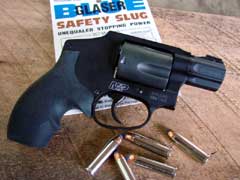
Smith & Wesson 340 M&P Lightweight Centennial
.357 Magnum Revolver.
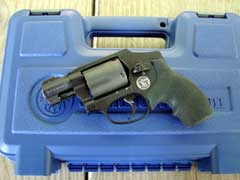
340 M&P comes with S&W hard plastic case.
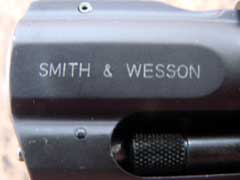
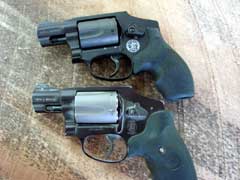
The 340 M&P (top) compared to Jeff's daily
companion, the 342PD (bottom).
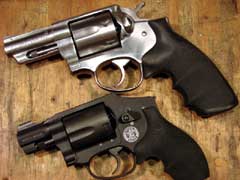
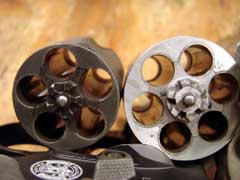
Compared to the medium-frame six-shot Ruger
Service Six, the handy size of the 340 M&P is readily
apparent.
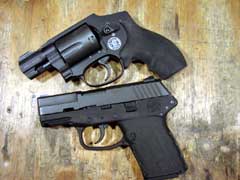
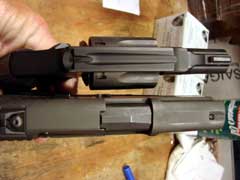
The 340 M&P compares favorably with Kel-Tec's
compact PF-9 9mm semi-auto pistol. What the M&P gives up
in firepower, it more than makes up for in stopping power.
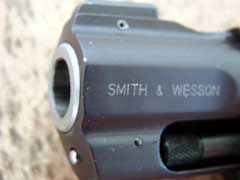
The 340 M&P features a stainless barrel with an
aluminum shroud.
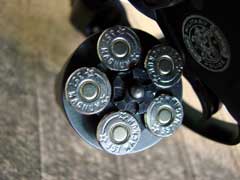
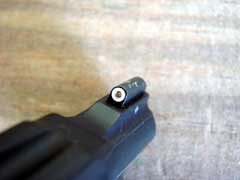
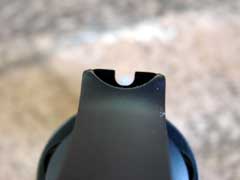

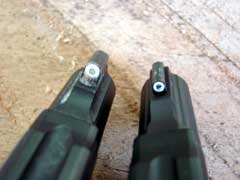
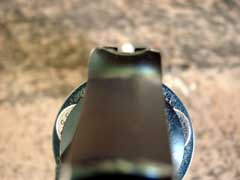
Comparison of the sights between the 340 M&P (top
three pictures and at right on second picture from bottom),
and Jeff's 342PD (bottom picture and at left on second picture
from bottom).
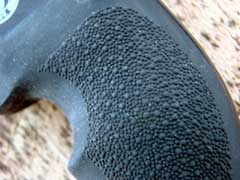
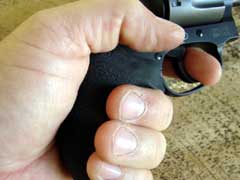
Soft rubber Hogue grip is small and excellent in design.
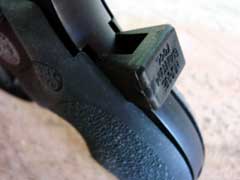
The one-piece grips are removable with the aid of an
included grip removal tool.
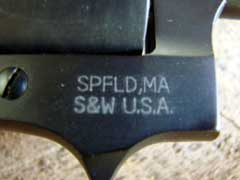
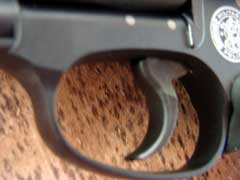
Smooth trigger is an aid in double-action shooting.
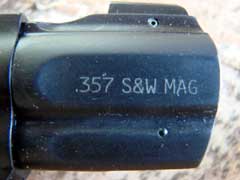
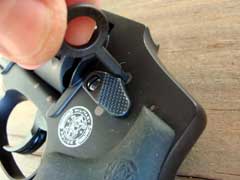
Like it or not, S&W's key-locking mechanism is here
to stay. Jeff chooses to ignore it, but it does not bother
him.
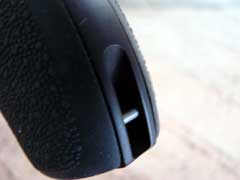
As befits its "Military & Police" name,
the 340 M&P incorporates a lanyard pin in the butt.
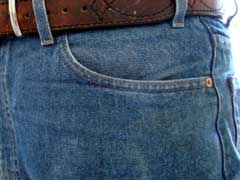
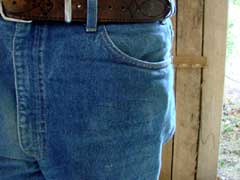
The 340 M&P is small enough to carry in a jeans
pocket unnoticed by the outside world, and lightweight enough
to be unnoticed by the bearer.
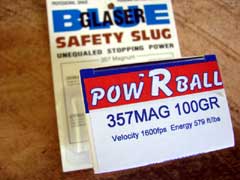
Two of Jeff's favorite carry loads for the 340 M&P.
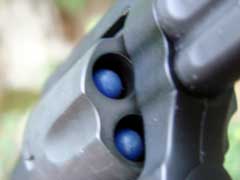
The 340 M&P loaded with Glasers.
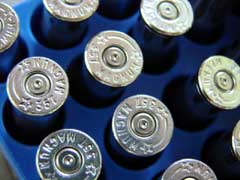
As the spent primers indicate, Cor-Bon is some hot ammo.
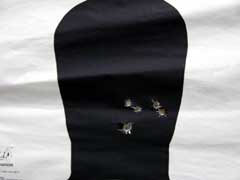
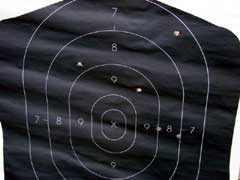
7-yard (top) & 25-yard (bottom) offhand rapid-fire
groups show the 340 M&P is plenty accurate for its
intended purpose.
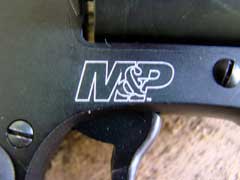
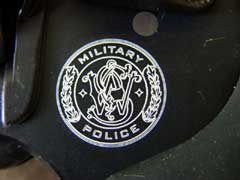
|
![]()